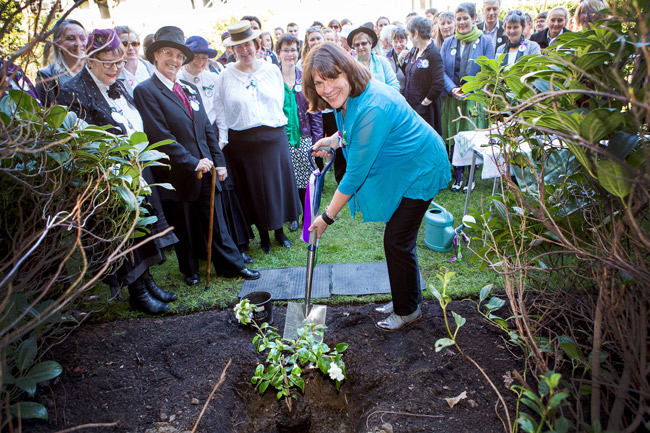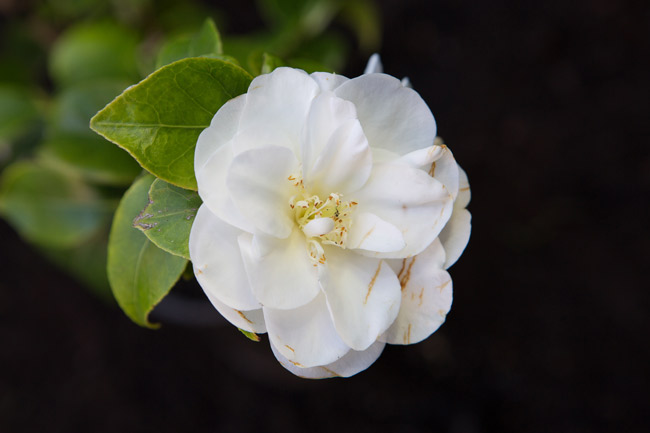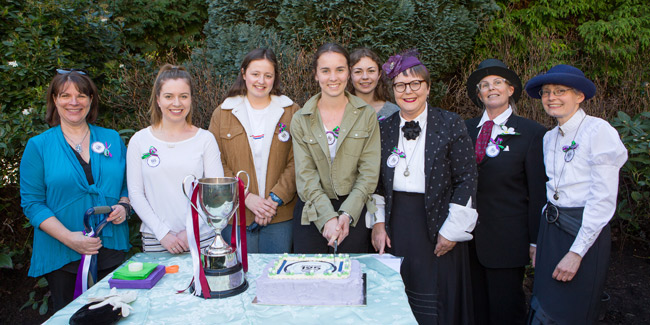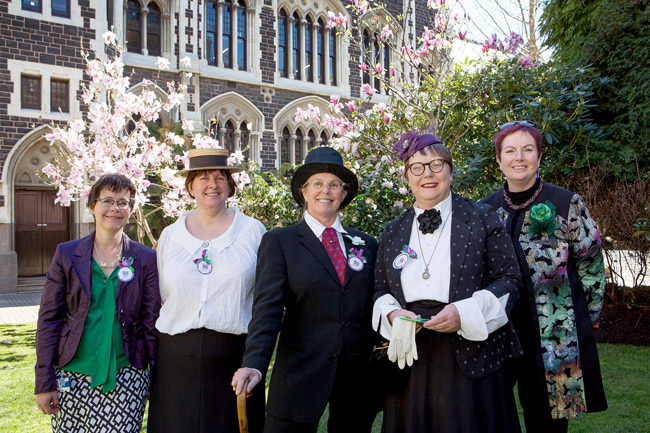Thursday 20 September 2018 10:58pm

Vice-Chancellor Professor Harlene Hayne plants a white camellia in the Marama Hall garden yesterday to mark the 125th anniversary of women's suffrage in New Zealand. Photos: Sharron Bennett.
The University yesterday joined the rest of New Zealand in celebrating the 125th anniversary of women’s suffrage, with the planting of another white camellia in the Marama Hall garden among others planted in 1993 to recognise the suffrage centenary.
The event, organised by the Staff Women’s Caucus (SWC), was an opportunity to acknowledge the anniversary of the passing of the Electoral Act 1893 on 19 September 1893 which gave all women in New Zealand the right to vote.

A flower on Otago's newest white camellia plant - the symbol of New Zealand women's suffrage.
The white camellia is the symbol of New Zealand women’s suffrage; suffragists gave them to their parliamentary supporters to wear in the house.
As well as planting the camellia, several women dressed up including SWC Co-chair Amanda Phillips channelling the leader of the suffrage movement Kate Sheppard and Summer School Director Dr Elaine Webster in a suit to represent Julius Vogel and the other men who supported suffrage. A special cake was cut, and members of the Dunedin Technical Premier Women’s football team also attended with the Kate Sheppard Cup – New Zealand’s premiere women’s football trophy which was re-named this year, and won by the club which includes six Otago students.

Vice-Chancellor Professor Harlene Hayne (left) with student members of the winning football team, and members of the Staff Women's Caucus.
SWC committee member Karin Warnaar says equity and equality of opportunity are at the heart of SWC, just as they are at the heart of the suffrage mission.
In her address at yesterday’s event, Vice-Chancellor Professor Harlene Hayne, who is Otago’s first woman Vice-Chancellor, highlighted the parallels between the progress towards suffrage and the progress towards educational access for women.
In August 1871, in response to a petition from 149 women, the University Council agreed unanimously to admit women to all classes. By the time of its second year, in 1872, the University roll of 70 included four women, which the Vice-Chancellor contrasted with current student demographics. She acknowledged the extra difficulties Caroline Freeman faced to become Otago’s first woman graduate.
Professor Hayne also shared with the 60-strong crowd Henry Wright’s famous Notice to Epicene Women:
“Electioneering Women are requested not to call here. They are recommended to go home, to look after their children, cook their husband's dinners, empty the slops, and generally attend to the domestic affairs for which Nature designed them. By taking this advice they will gain the respect of all right-minded people - an end not to be attained by unsexing themselves and meddling in the masculine concerns of which they are profoundly ignorant.”

Staff Women's Caucus members at yesterday's event (from left) Marilyn Merriman, Karin Warnaar, Elaine Webster, Amanda Phillips and Nicola Walmsley.
Ms Warnaar says the event was a wonderful celebration, and thanks the Vice-Chancellor for taking the time to undertake the honours, all of those who attended, and Property Services.
“The word proud kept cropping up; this is an achievement that so many New Zealanders, even 125 years on, feel really good about.”
